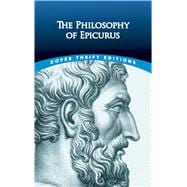Despite its modern-day connotations of hedonism, "Epicureanism" has more to do with living a mindful, uncomplicated life. Epicurus — who was born at Samos, Greece, in 341 BC and died at Athens in 270 BC — founded a school of philosophy that focused on maximizing simple pleasures and minimizing pain, such as the irrational fear of death. "Death is nothing to us," declared Epicurus, "since when we are, death has not come, and when death has come, we are not."
The philosopher did not believe that humans would be punished for their sins after death, and he stressed the lifelong search for lasting pleasures: tranquility, friendship, and philosophical inquiry. Although Epicurus was a prolific author, very few of his writings have survived. This volume, edited and translated by George K. Strodach, features three important letters and a collection of observations preserved by the biographer of ancient philosophers, Diogenes Laertius. Students of philosophy and ancient history will appreciate this compilation of Epicurus's enduring wisdom.
The philosopher did not believe that humans would be punished for their sins after death, and he stressed the lifelong search for lasting pleasures: tranquility, friendship, and philosophical inquiry. Although Epicurus was a prolific author, very few of his writings have survived. This volume, edited and translated by George K. Strodach, features three important letters and a collection of observations preserved by the biographer of ancient philosophers, Diogenes Laertius. Students of philosophy and ancient history will appreciate this compilation of Epicurus's enduring wisdom.








